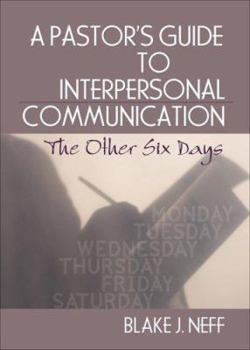A Pastor's Guide to Interpersonal Communication: The Other Six Days
Select Format
Select Condition 
Book Overview
Improving your powers of communication can encourage powerful communication with your parishioners.
A Pastor's Guide to Interpersonal Communication: The Other Six Days provides students preparing for the pastoral ministry with specialized training in communications that focuses on the kind of one-on-one conversations they can expect to have with their parishioners. This comprehensive book examines a variety of essential topics, including perception, self-disclosure, verbal and nonverbal messages, listening, stages of relational development, power assertiveness and dominance, conflict management, forgiveness, persuasion, dual relationships, pastoral family communication, and how to develop a communications model. Each chapter includes "Pastoral Conversations," real-life dialogues presented for analysis; "Key Concepts" for quick student review; "Meanings Mania," self-tests on vocabulary; and "Unleashing the Power of Interpersonal Communication," student exercises that reinforce the practical aspects of key principles.
While many pastors have a great love for the people they minister to, they have difficulty demonstrating that love because they lack the skills to develop and maintain relationships. This book explores how communication works and how to make it work for you, applying the best available interpersonal communications techniques to your relationships with the real people of the church--your parishioners.
A Pastor's Guide to Interpersonal Communication: The Other Six Days examines:
how self-disclosure works and when it's appropriate for a pastor stumbling blocks and building blocks for effective listening the differences between power, assertiveness, and dominance and when to use each conflict management styles and negotiation strategies several myths about forgiveness dual relationships and how to avoid them pitfalls to avoid in pastoral family communication and much moreA Pastor's Guide to Interpersonal Communication: The Other Six Days is an essential resource for Bible college students and for students at the pre-ministerial and seminary levels. It's also a valuable professional tool for clergy practitioners who need help with their communication skills.





